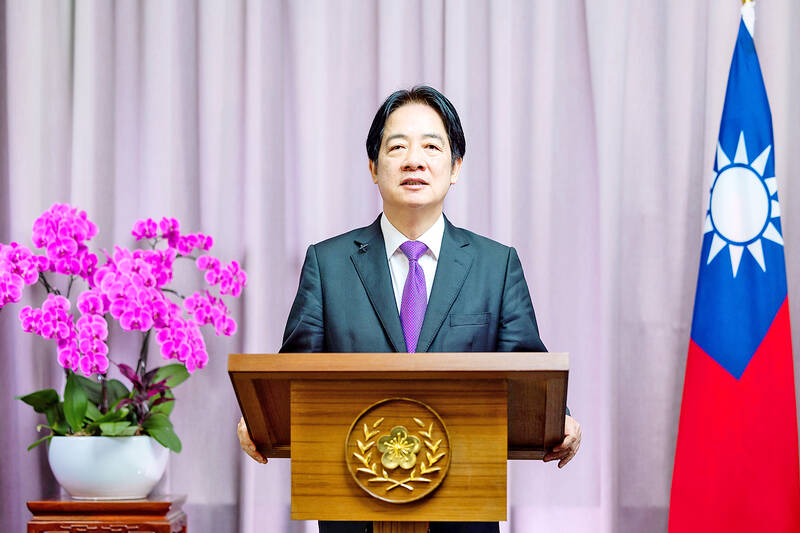Taiwan hopes to join like-minded nations under the democratic umbrella and jointly counter authoritarian aggression, President William Lai (賴清德) said in a prerecorded speech during the annual Concordia Summit in New York on Tuesday.
Lai addressed the summit via video at Concordia’s invitation, using the opportunity to speak on the issue of Chinese aggression toward Taiwan and Beijing’s distortion of UN Resolution 2758.
Lai’s comments came on the heels of the 79th session of the UN General Assembly, which opened on Tuesday.

President William Lai addresses the Concordia annual summit in New York yesterday via a prerecorded video.
Photo courtesy of the Presidential Office
China has “distorted” UN Resolution 2758 “in support of its ‘one China’ principle,” he said.
Through its misinterpretation of the resolution, Beijing has falsely “claimed that Taiwan is part of the People’s Republic of China” and that “we have no right to participate in the UN system and other international fora.”
“Democratic Taiwan and authoritarian China are not subordinate to each other, and we will maintain peace and stability in the Taiwan Strait by promoting our Four Pillars of Peace action plan,” Lai said.
Lai unveiled his “four pillars” plan during his inauguration speech on May 20. The pillars refer to his emphasis on defensive capability, economic security, partnerships with other democracies, and stable and consistent cross-strait policy.
“Our goal is to make Taiwan stronger, because a stronger Taiwan is better able to promote democracy, peace and prosperity around the world,” he said.
Lai said that Chinese aggression is a threat to the entire international community, because China “intends to change the rules-based international order and achieve international hegemony.”
In the face of that threat, Taiwan would continue to cooperate with like-minded partners on “democracy chips,” and national defense as a means of achieving peace and deterring authoritarianism, he said.
The president also called on other nations to support democratic institutions worldwide and “counter authoritarian aggression,” including China’s military intimidation in the Taiwan Strait, and the East and South China seas, and Russia’s invasion of Ukraine.
Following Lai’s video message, Representative to the US Alexander Yui (俞大?) and former US undersecretary of state Keith Krach discussed UN Resolution 2758.
“The Chinese Communist Party claims that this resolution proves Chinese sovereignty over Taiwan and is likely to invoke that as an excuse to attack Taiwan,” Yui said. “More and more countries, including those in Europe, are recognizing Taiwan’s democracy and are beginning to see through China’s claims.”
In the past two years, former president Tsai Ing-wen (蔡英文) addressed the UN General Assembly indirectly through nonprofits and talked about the challenges facing Taiwan and her determination to safeguard democracy, he said.
This was the first time Lai addressed the international community before a UN General Assembly about his defense and diplomacy policies. Lai emphasized his determination to strengthen Taiwan’s resilience, his commitment to regional peace and his pursuit for international recognition of the nation’s sovereignty.
Separately, Lai told a community-based civil defense training event that Taiwan would not sign any peace accord with Beijing that implies the nation is part of China.
Academia Formosa, a Christian non-governmental organization, hosted the event marking the launch of civil defense and natural disaster response drills for volunteers in Nantou County’s Puli Township (埔里).
The government is committed to continuing Tsai’s policy to bolster the nation’s defensive capabilities and decouple its economy from China, Lai said.
This means prioritizing the development of a self-sufficient defense industry, increasing foreign military acquisitions, and strengthening the nation’s defensive capabilities, including facilitating civil defense programs, he said.
Taiwan’s solidarity with the alliance of democracies is essential to maintaining the nation’s deterrence against authoritarianism, he said.
Lai said the national security strategy of peace through strength, meaning taking a stance with the world’s democracies and avoiding conflict by preparing for war, is key to deterring any autocratic adventurism.
The government “absolutely will not sign” any peace accord with China if its terms compromise national sovereignty, he said, adding that a robust civil defense helps protect Taiwan from being coerced into inking treaties.
Taiwan is forever committed to maintaining its free and democratic constitutional order, its mutually non-subordinate relationship with China, and the exclusive right of Taiwanese to determine their nation’s future, he said.
Source: Taipei Times - 2024/09/26




















